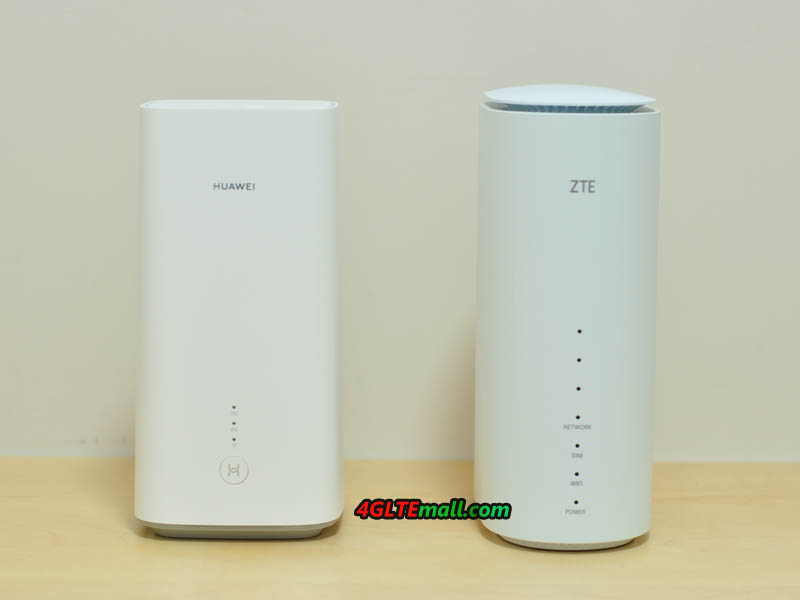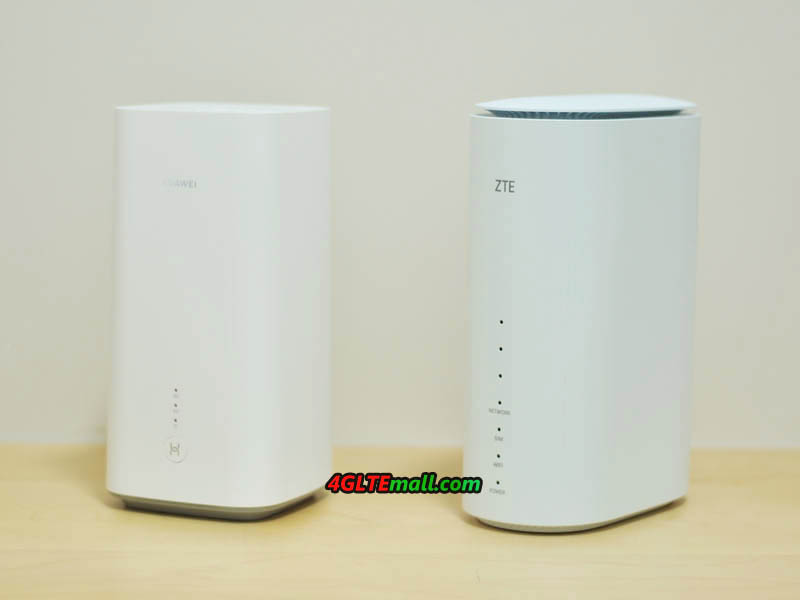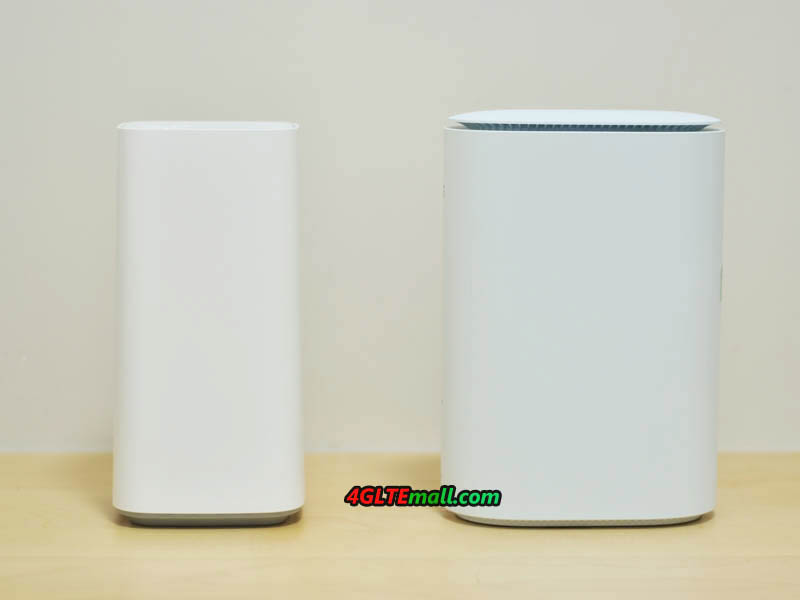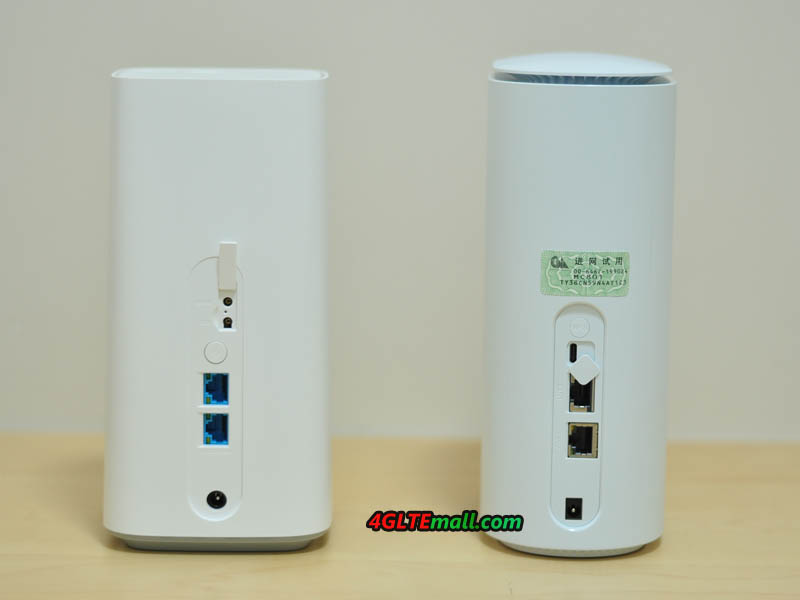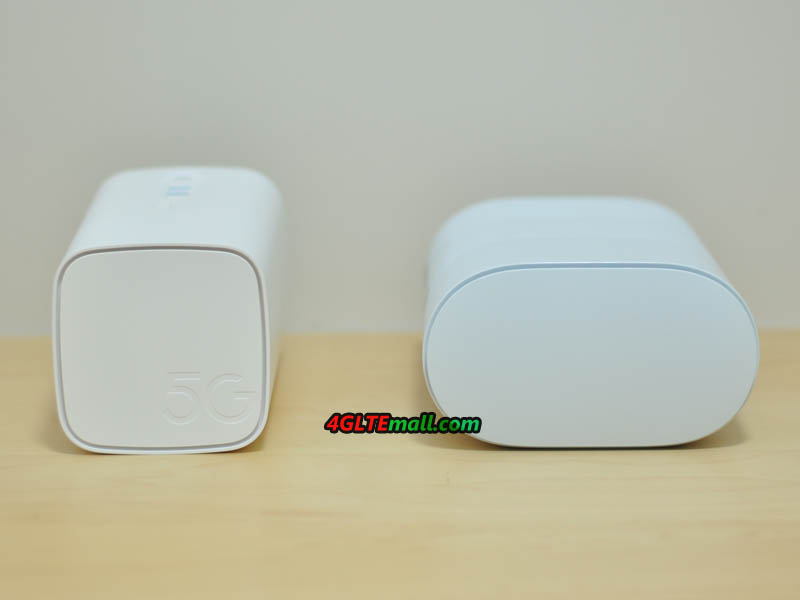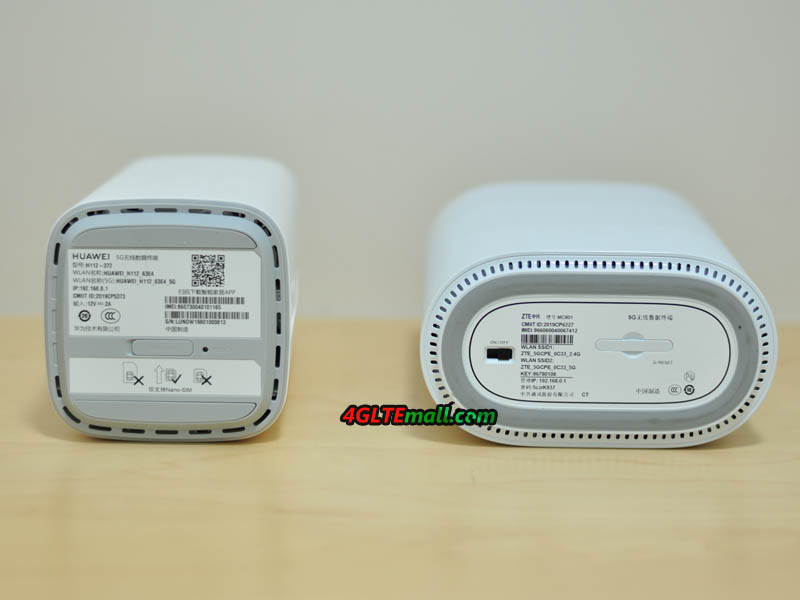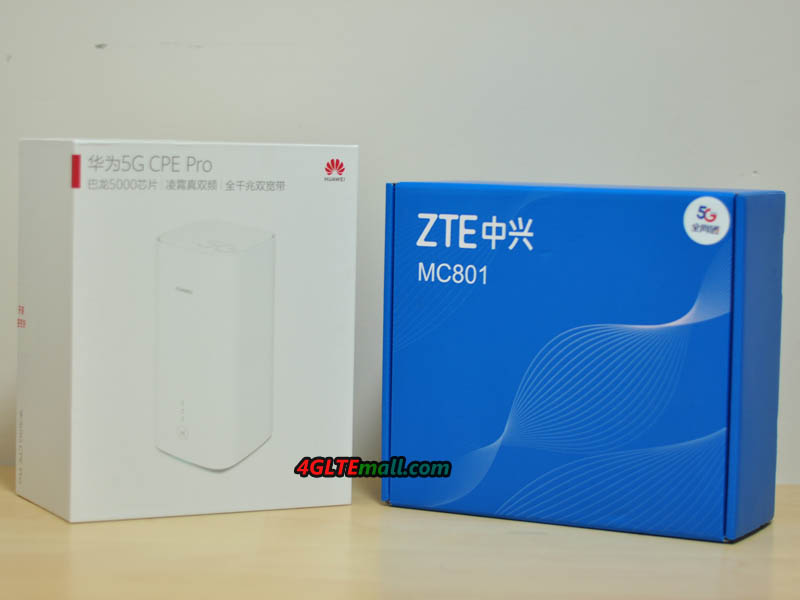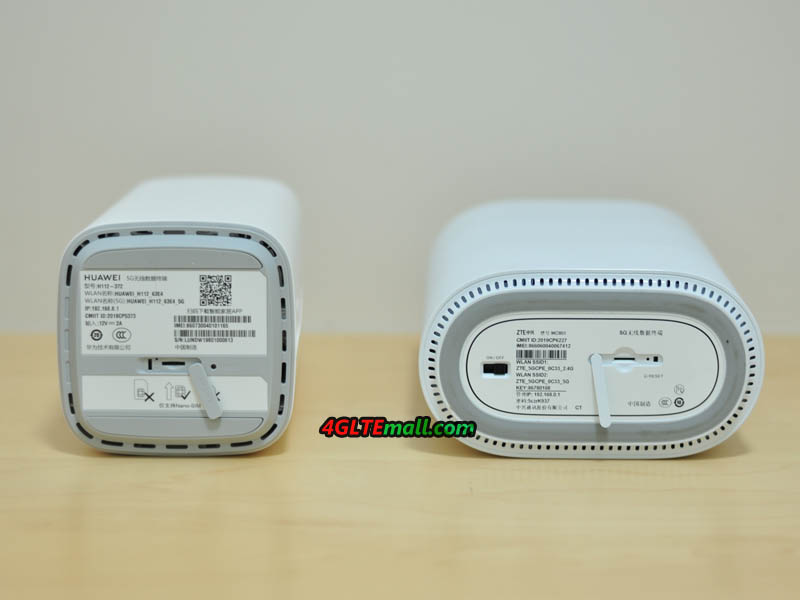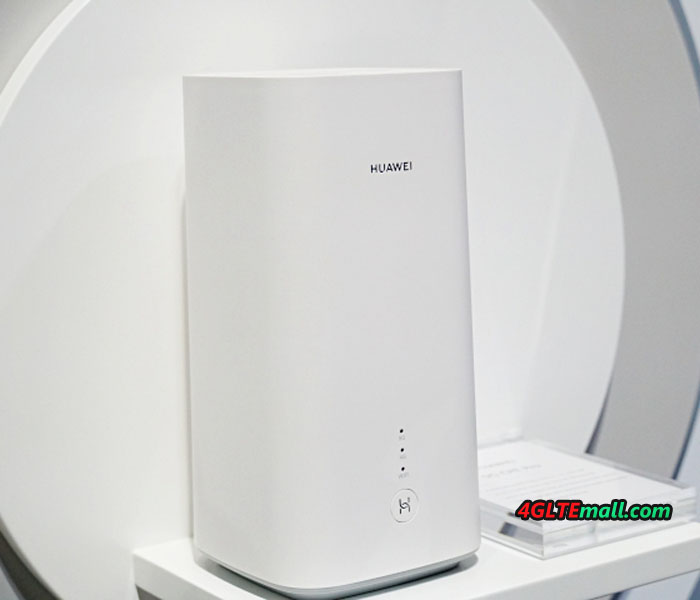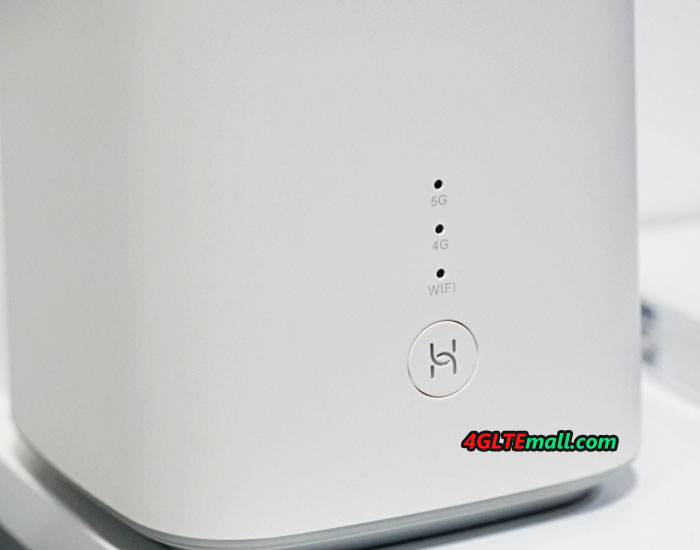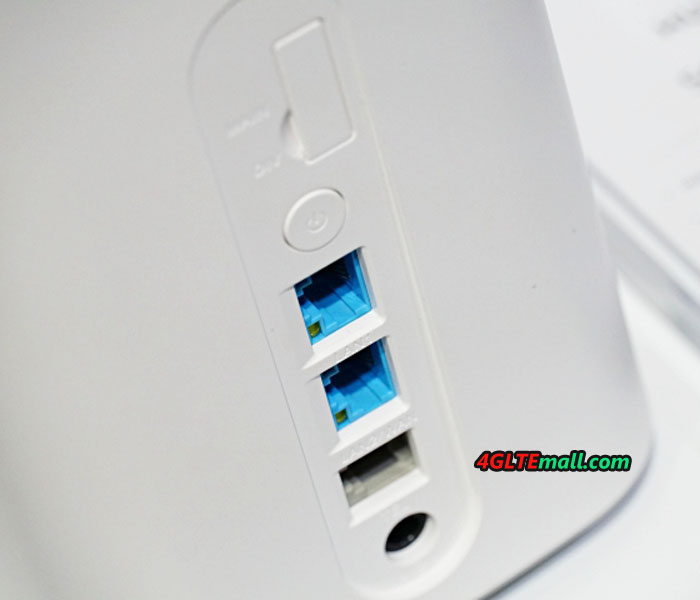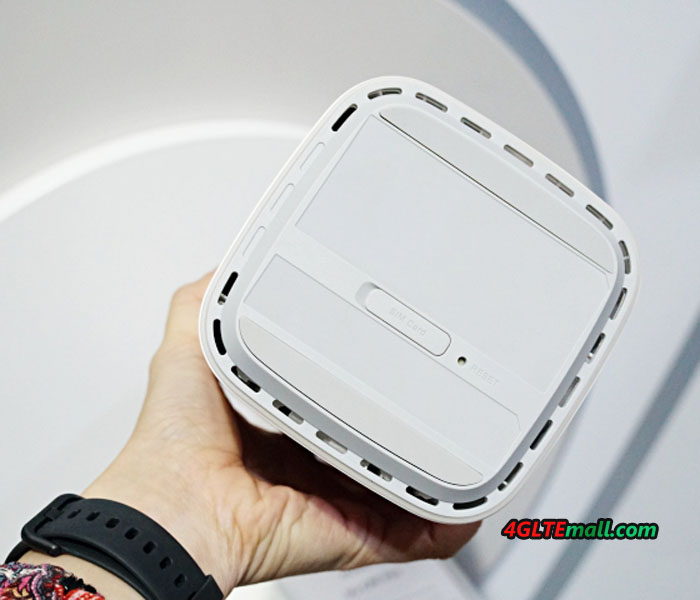As the first 5G WiFi router, Huawei 5G CPE Pro is now being well-known by many customers worldwide and it has been available for a few months. As the competitor to Huawei, ZTE is also one of the important 5G vendors in the world and its new 5G router ZTE MC801 is available recently. For many users, they wonder which one is better between ZTE MC801 and Huawei 5G CPE Pro? And what’s the difference between Huawei 5G CPE Pro and ZTE MC801? Today, we will compare the two 5G wireless routers to provide some clue for the advantage and disadvantage from the two Chinese 5G vendors.
ZTE MC801 VS Huawei 5G CPE Pro Appearance Difference
From the ZTE MC801 review and Huawei 5G CPE Pro review, you may get some knowledge about the two routers. They both have cool and modern design. Below the images will show the design difference. The Huawei 5G CPE Pro looks similar to its predecessor model Huawei B618 4G Router. ZTE MC801 Router adopts the runway-type streamline design, which won iF Design Award 2019. The design looks really cool.
On front of the routers, they both have some LED indicators to show the connection status. Huawei 5G CPE Pro show the 5G, 4G and WiFi status with a button for Hilink while ZTE 5G Router MC801 shows the status of Network, WiFi, SIM, and Power. On the back, the Huawei 5G CPE Pro (H112-372) has two LAN ports(one also for WAN), one power button, two connectors for external antenna. The ZTE 5G CPE has two LAN ports, one USB Type C port and one WPS button. Unlike the Huawei 5G CPE Pro and the predecessor models such as ZTE MF275R, there is no connector for external antenna. So if you are located at somewhere with weak signal, ZTE MC801 may not be a good option because it can’t provide the possibility to connect external 4G or 5G antennas.
The two 5G WiFi CPEs both use NANO SIM cards. And the SIM card slots are located at the bottom of the router with the reset button. At the side of the SIM Card slot, the model number, IMEI number, WLAN name/SSID, WiFi key and IP log in address are listed. The difference is that ZTE MC801 tells the two WLAN SSID names for 2.4GHz and 5GHz, and ZTE MC801 tells the IP log in password (not admin as 4G WiFi routers). Huawei 5G CPE Pro don’t tell the IP log in password because it will be same as the WiFi connection password, which needs to be set up by the users. At the beginning, the WLAN network of the Huawei 5G CPE is open.
Huawei 5G CPE Pro VS ZTE MC801 Specifications
We summarized the specifications for Huawei 5G CPE Pro and ZTE MC801 in the table for your reference.
| Model | Huawei 5G CPE Pro | ZTE MC801 |
| Product type | 5G WiFi Router | 5G WiFi Router |
| 5G Network Mode | NSA/SA | NSA |
| Chipset | Balong 5000 | Qualcomm Snapdragon X50 + IPQ8072 + SM8150 |
| Standard | 3GPP Release 15 | 3GPP Release 15 |
| 5G Peak Data rates | DL 2.33Gbps,UL 1.25Gbps | DL 2.22Gbps, UL 211Mbps |
| 4G Peak Data rates | DL 1.6Gbps, UL 150Mbps | DL 2Gbps/UL 211Mbps |
| Variant model | H112-370 and H112-372 | ZTE MC801A |
| Supported 5G LTE frequency bands | * Huawei H112-372: n41/n77/n78/n79 * Huawei H112-370: n78 |
ZTE MC801: n41/n77/n78/n79 |
| Supported 4G LTE frequency bands | * Huawei H112-372: B1/3/5/7/8/18/19/20/28/32/34/38/39/40/41/42/43 * Huawei H112-370: B1/3/5/7/8/18/19/20/28/32/34/38/39/40/41/42/43 |
ZTE MC801: 600MHz~3.8GHz |
| WLAN | 802.11a/b/g/n/ac/ax(WiFi 6), dual-band | 802.11a/b/g/n/ac/ax(WiFi 6), dual-band |
| Max supported users | ? | 128 users |
| MIMO | 4 X 4 MIMO | 4 X 4 MIMO |
| Antenna | Two, TS-9 connectors | N/A |
| Buy Antenna | Huawei 5G CPE Pro External Antenna | N/A |
| App management | Huawei SmartHome App | N/A |
| SIM Size | NANO SIM | NANO SIM |
| Battery | No | No |
| Dimensions | 99 × 107 × 215mm | 225 x 154.5 x 87 mm |
| Interfaces | * 1 x power adapter port * 1 x WAN / LAN GE port * 1 x LAN GE port * 1 x telephone port(RJ11)(depends) * Two external LTE antenna ports (TS-9 type) * One SIM card slot |
* 1 x power adapter port * 2 x LAN GE port * 1 x USB type C port * One SIM card slot |
| Datasheet | Huawei 5G CPE Pro Datasheet(PDF) | ZTE MC801 Datasheet(PDF) |
| User Manual | Huawei 5G CPE Pro User Manual(PDF) | ZTE MC801 User Manual(PDF) |
| Other features | firewall, PIN protection, MAC address filtering, Wi-Fi encryption authentication, VPN tunnel / VPN penetration, IP penetration, IPv6 and IPv6 / IPv4 dual stack, multi-APN, WeBUI, administrator maintenance, HOTA, etc | MAC address filtering, Wi-Fi encryption authentication, VPN, IPv6 support, VoLTE, DMZ, SSID, Guest SSID, Port Forwarding, Watchdog Service, DHCP settings, network selection, APN settings etc. |
| Firmware download | Huawei 5G CPE Pro Firmware | ZTE MC801 Firmware |
| Review | Huawei 5G CPE Pro Review | ZTE MC801 Review |
| Price/USD | 699.00USD | 799.00USD |
Summary
From the table, we can see they have different chipsets which deceide they support different network mode: Huawei 5G CPE Pro support 5G NR dual mode: NSA/SA while ZTE MC801 supports only NSA mode. Huawei 5G CPE Pro has two variant models now, while ZTE MC801 has only one model now. Perhaps there will be more variant models available in near future.
Huawei 5G CPE Pro has two connectors like other Huawei 4G WiFi Routers, but ZTE MC801 doesn’t provide the connector for external antenna, which is not good for many users. Per our experience, many of 4G router users may need external antenna to get better signal and faster surfing speeds.
They both provide the WiFi 6 and this would be the mainstream for 5G wireless devices. Huawei 5G CPE Pro provide the APP management option by Huawei SmartHome APP, however, ZTE MC801 has no this option. According to our check, ZTE MC801 settings can only be done through a browser. And it provides PC and Mobile settings option, which means, users can do the setup through web browser from a cell phone.
The ZTE MC801 price is higher than that of Huawei 5G CPE Pro, perhaps because the Qualcomm chipset is more expensive than Huawei Balong chipset. One thing we have to mention is that the ZTE MC801 is much heavier than Huawei 5G CPE Pro. We suppose this is due to the complex heat radiation system in the router.
Regarding the real performance of surfing speeds, we will take future test in near future.
